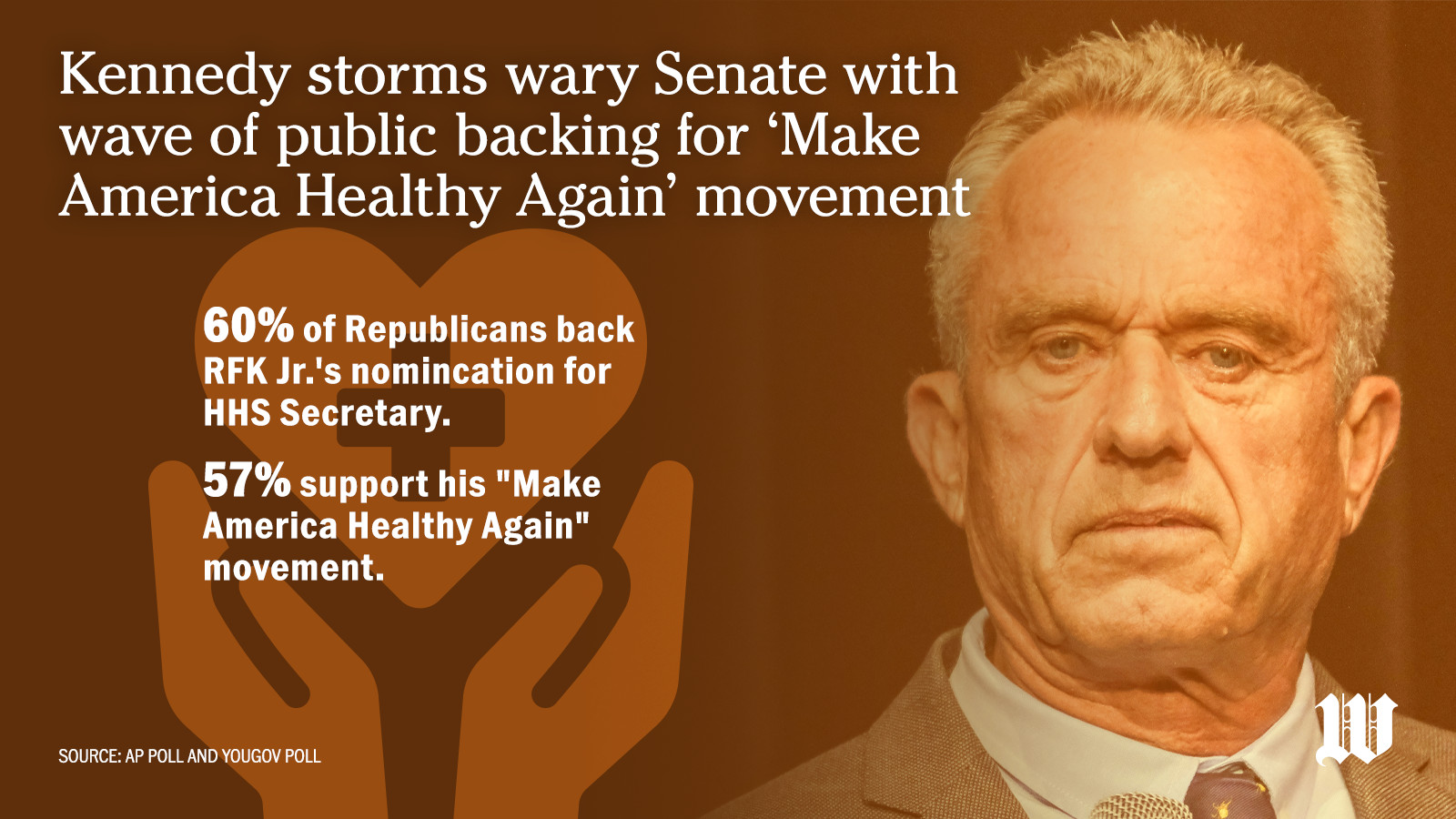Senate Republicans will be under intense public pressure to approve President Trump’s nominee for health and human services secretary, Robert F. Kennedy Jr., whose vaccine skepticism and crusade to overhaul the nation’s public wellness regime have turned him into a populist health hero backed by many in the Republican base.
Mr. Kennedy will meet with 25 senators this week to discuss his nomination. The Department of Health and Human Services position would put him in charge of the nation’s public health programs and policies, including Medicaid, Medicare and the National Institutes of Health.
According to an AP/NORC poll, he is among the most popular of Mr. Trump’s Cabinet nominees among Republican voters. Six in 10 support his nomination.
Among Republican lawmakers, he may be the most divisive choice and is poised to test Senate Republicans’ loyalty to the president-elect.
Many senators in both parties won’t commit to confirming Mr. Kennedy, a former environmental lawyer who quit his independent bid for president to endorse Mr. Trump.
Senators have voiced concerns about Mr. Kennedy’s skepticism of vaccines, particularly the COVID-19 shot and childhood immunizations. They question his opposition to fluoridated water, which has reduced tooth decay, pesticides, which have enabled abundant, cheap food production, and other disruptive stances regarding public health.
Sen. James Lankford, Oklahoma Republican, said he is alarmed by the former Democrat’s support for abortion.
Sen. Charles E. Grassley, Iowa Republican, opposes Mr. Kennedy’s call to end genetically modified foods, which would significantly impact nearly all of Iowa’s corn growers. Mr. Grassley and other Republican lawmakers from farming states have questioned Mr. Kennedy’s desire to ban pesticides from agriculture, which likely would upend the nation’s food production.
Mr. Kennedy came to Capitol Hill armed with significant approval from Republican voters.
A YouGov poll found that 57% of Republicans favor his Make America Healthy Again initiative, aimed at reducing childhood obesity and what Mr. Kennedy calls an epidemic of disease that has created a dependency on pharmaceuticals.
Although he dropped out of the presidential race, Mr. Kennedy remained on the ballot in 33 states and received more than a half-million votes.
Now that Mr. Trump has nominated him, Mr. Kennedy promises to “restore HHS to its incorruptible scientific research and public health priorities.”
He told reporters on Capitol Hill on Monday that he is “all for” the polio shot, even though one of his key advisers is trying to revoke the Food and Drug Administration’s approval of the vaccine.
Aides said his meetings with senators are focused on initiatives to improve health.
Mr. Kennedy embraced the MAHA pledge long before merging his plans with the Trump team.
“I’m going to end the chronic disease epidemic, which is right now 80% of our medical dollars,” Mr. Kennedy told The Washington Times in an interview this year when he was running for president.

Mr. Kennedy’s public favorability comes from a diverse group of people. He supports legalizing sales of raw milk, which is growing in popularity among health food advocates.
He wants deeper scrutiny of vaccine efficacy and safety, particularly childhood immunizations that he has linked to autism.
His stance against COVID-19 vaccine mandates helped fuel his popularity when he entered the presidential race.
Mr. Kennedy also seeks to rid food of additives that may be unsafe, especially for children, and are banned in Europe. He has targeted the colorful dyes in Froot Loops, for example.
Sen. Bernard Sanders of Vermont, a democratic socialist who disagrees with Mr. Kennedy on vaccines, has found common ground with him as a fellow critic of the processed food industry.
The Centers for Disease Control and Prevention reported last year that more than 40% of adults are obese.
“We have epidemics in our country in terms of diabetes and obesity, and I think we’ve got to tell the food industry, ‘Stop making our kids overweight and causing all kinds of health problems,’” Mr. Sanders told NBC’s “Meet the Press” when asked about Mr. Kennedy’s nomination.
Mr. Kennedy’s broad appeal could make it difficult for Senate Republicans, and perhaps some Democrats, to reject him.
Republicans will control the Senate in January with 53 votes. Mr. Kennedy could lose only three Republicans if all of the Democrats vote against him.
Some Democrats may support him.
Mr. Sanders hasn’t decided, nor has Sen. John Fetterman, Pennsylvania Democrat, or Sen. Cory A. Booker, New Jersey Democrat, who, like Mr. Kennedy, wants to lower the nation’s obesity rates.
“I’ve heard him say a lot of things that are absolutely right,” Mr. Booker told reporters after Mr. Kennedy was nominated.
Mr. Trump sought to tamp down fears that Mr. Kennedy would seek to ban immunizations and said he would focus on lowering the costs of drugs, not eliminating them.
“I think he’s going to be much less radical than you would think. I think he’s got a very open mind, or I wouldn’t have put him there,” Mr. Trump told reporters Monday.
Sen. Rick Scott, a Florida Republican and staunch Trump ally, met with Mr. Kennedy on Monday and pledged his support.
“Finally,” Mr. Scott said, “we’re going to have an HHS secretary that wakes up every day and says, ‘How do we keep everybody healthy in this country?’”
• Susan Ferrechio can be reached at sferrechio@washingtontimes.com.




Please read our comment policy before commenting.